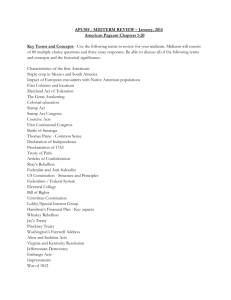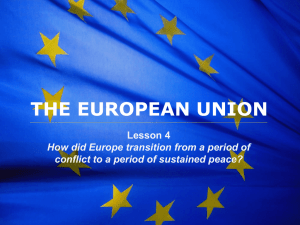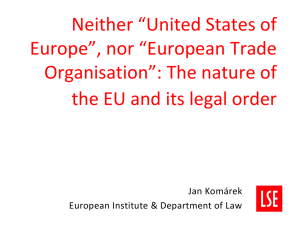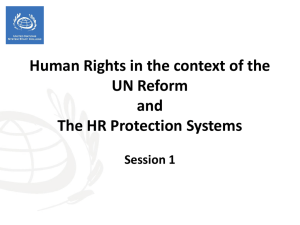CESP– spring 2008
advertisement
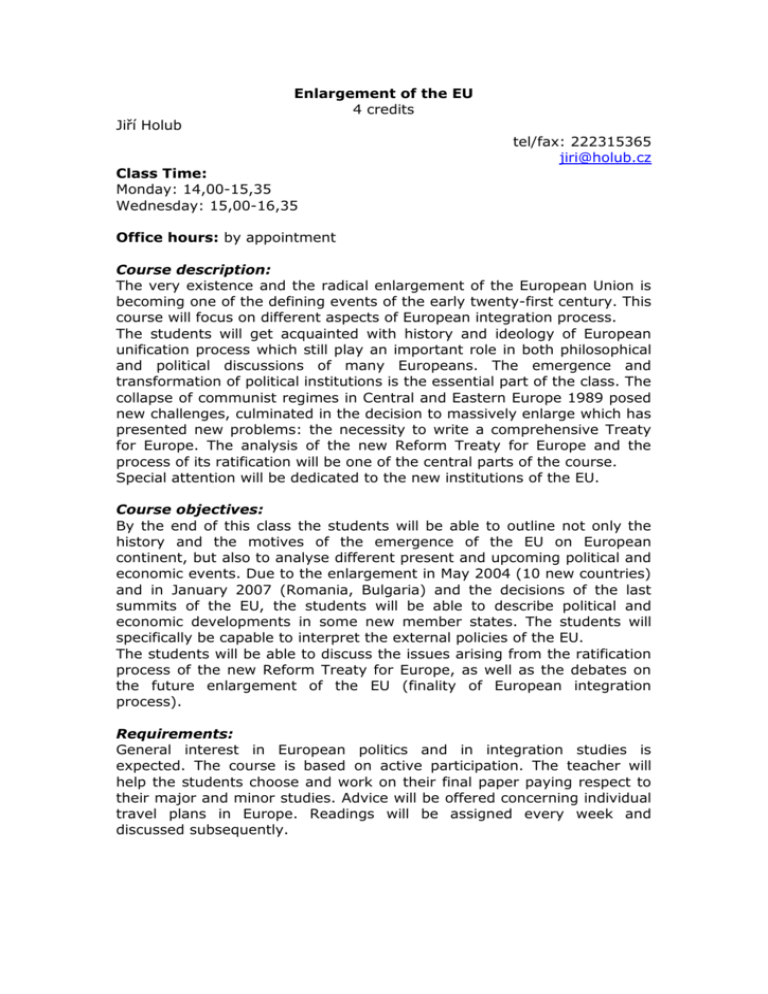
Enlargement of the EU 4 credits Jiří Holub tel/fax: 222315365 jiri@holub.cz Class Time: Monday: 14,00-15,35 Wednesday: 15,00-16,35 Office hours: by appointment Course description: The very existence and the radical enlargement of the European Union is becoming one of the defining events of the early twenty-first century. This course will focus on different aspects of European integration process. The students will get acquainted with history and ideology of European unification process which still play an important role in both philosophical and political discussions of many Europeans. The emergence and transformation of political institutions is the essential part of the class. The collapse of communist regimes in Central and Eastern Europe 1989 posed new challenges, culminated in the decision to massively enlarge which has presented new problems: the necessity to write a comprehensive Treaty for Europe. The analysis of the new Reform Treaty for Europe and the process of its ratification will be one of the central parts of the course. Special attention will be dedicated to the new institutions of the EU. Course objectives: By the end of this class the students will be able to outline not only the history and the motives of the emergence of the EU on European continent, but also to analyse different present and upcoming political and economic events. Due to the enlargement in May 2004 (10 new countries) and in January 2007 (Romania, Bulgaria) and the decisions of the last summits of the EU, the students will be able to describe political and economic developments in some new member states. The students will specifically be capable to interpret the external policies of the EU. The students will be able to discuss the issues arising from the ratification process of the new Reform Treaty for Europe, as well as the debates on the future enlargement of the EU (finality of European integration process). Requirements: General interest in European politics and in integration studies is expected. The course is based on active participation. The teacher will help the students choose and work on their final paper paying respect to their major and minor studies. Advice will be offered concerning individual travel plans in Europe. Readings will be assigned every week and discussed subsequently. Class attendance is mandatory. The midterm test (app. 30 minutes) will be written in the classroom in the middle of the program. The midterm test will test basic acquaintance with the issues discussed in the first half of the program. The final written exam in the classroom (app. 30 minutes) will test basic acquaintance with the issues discussed in the second half of the program. The final paper (8-10 pages) will will be handed over for evaluation in the last week of the program. The selection of the topic will start by the end of March, the teacher will help with respective sources or interview persons. Assessment: The grading will be based on attendance and participation in the discussions, midterm essay, final written exam and final paper, including the presentation of the paper in the class. Class attendance and active participation: 20% Midterm essay: 20 % Final written test: 20% Final Paper (including the presentation in the class): 40 % Bibliography: Due to the present controversial discussions about the future course of the European integration the students will be continuously offered EU Press release, interviews with politicians, newspaper articles and studies in academic journals. Ash, Timothy Garton: Free World. Penguin Books, 2004 New Reform Treaty for EU. EU Information Centre in Prague, 2004 Gillingham, John: European Integration 1950 - 2003. Cambridge University Press, 2003 Kenney, Padraic: A Carnival of Revolution in Central Europe 1989. Princeton University Press, 2002 Pagden, Anthony (edit.): The Idea of Europe. Cambridge U Press, 2002 Wilson, Kevin, and van der Dussen, Jan (eds.): The History of the Idea of Europe. London, 1993 Recommended newspapers and periodicals: Perspectives. Review of Central European Affaires. Published in: Institute of International Relations, Prague Prague Business Journal. Prague The Prague Post (English-speaking weekly), Prague Weekly structure of the course: The readings will be recommended and assigned to every lesson. The lecturer will prepare and distribute selected articles. 1st week Introduction to the course. The relation between European studies and the studies of the EU. International organizations and theories of integration. European geopolitics. Terminology and bibliography. The history of the idea of Europe. Historical survey of the attempts to organize Europe. 2nd week History of European integration process 1945 - 1989: Economic reconstruction and Cooperation. Fathers of Europe: Winston Churchill and others. Security and the Cold War. The 3 rd week 4th week 5th week 6th week 7th week 8th week 9th week 10th week 11th week 12th week road from Rome 1957 to Maastricht 1991/92. The road from Rome 1957 to Maastricht 1991/92. The Maastricht treaty. The challenges of 1989: The decision to enlarge towards Central and Eastern Europe and the consequence: Radical discussions on the limits of the EU. The controversy between eurooptimists and eurosceptics. EU enlargement policy. The discussions about the " finality " of the EU. Overcoming the division of Europe. The case study: Cyprus The institutional framework of the EU and its history: the European Council, the European Commission, the European Parliament, European Court of Justice. The results of the elections to European Parliament in June 2004 and resulting questions. The elections in June 2009. Selection of the topics for the final papers. Mid-term test. The questions linked to the ratification process of the new Reform Treaty for Europe in the member states. French and Dutch referendums concerning the former Constitution for Europe. Evaluation of the midterm test Economic policies of the EU: the EU budget, Single market and Single currency, Agricultural policy, Regional policy, Environmental policy. Transitional conditions for the new member states. The perspective of the future enlargement: Croatia, Turkey. The question of the province of Kosovo. Foreign and security policy of the European Union. Reading: The Reform Treaty – selected pages concerning the CFDP. External economic relations. Relations with the United States. Relations with the Russian Federation. The CAP - The Common Agricultural Policy The former Constitution for Europe 2004. Main issues of the present discussions: federal or confederal Europe ? The future of the ratification process – Reform Treaty Process. Reading: Survey of international press articles published in November 2009 regarding the EU ( selected press articles will be prepared and distributed by the professor). Final written exam. European citizenship and identity ? Opinions of some prominent European thinkers. Presentation of the final papers. Evaluation of the course.
